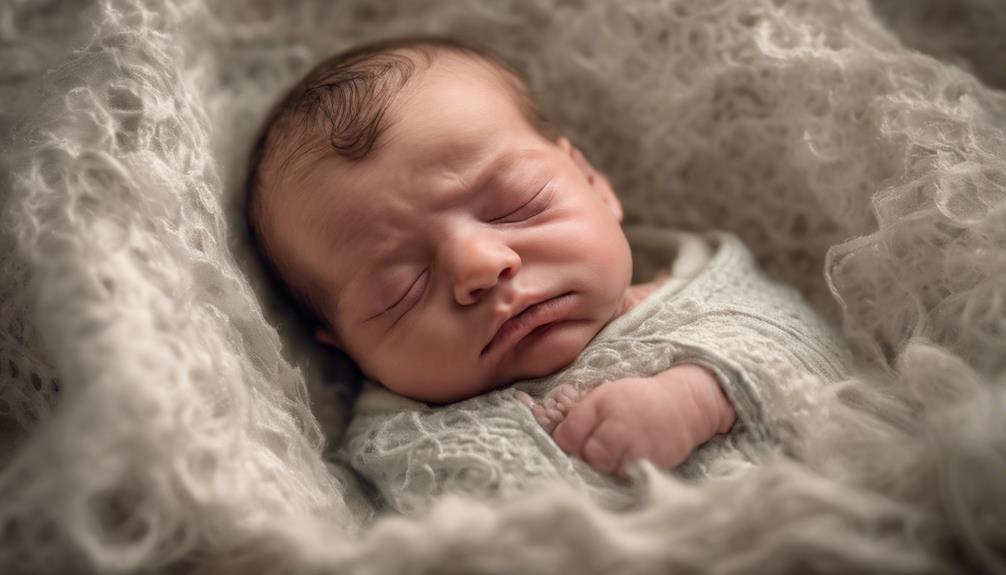As new parents, we've all experienced the joy of deciphering the symphony of sounds our newborns produce during sleep. One particular tune that often raises concerns is the rhythmic grunting that accompanies their slumber.
But, before jumping to conclusions, it's important to understand the reasons behind this phenomenon and whether it truly disrupts their rest. So, what exactly is the deal with our little ones' grunting and its potential impact on their sleep cycles?
Let's explore this further to make sure our babies are getting the peaceful rest they need.
Key Takeaways
- Grunting is a normal behavior in newborns, linked to developing respiratory and digestive systems.
- It usually does not disrupt a newborn's sleep and decreases as they grow.
- Tips like elevating the head, using a humidifier, and gentle massages can help alleviate grunting.
- Watch for signs like irregular breathing patterns or fever, which may indicate underlying issues.

Frida Baby 3-in-1 Cool Mist Humidifier for Large Rooms, Top Fill Humidifier for Bedroom, Allergy Relief, 60 Hour Runtime + Nightlight, Auto Shut-Off, Quiet, Carry Handle, Essential Oil Diffuser
ULTRASONIC COOL MIST HUMIDIFIER: Our baby humidifier converts water into a refreshing mist that runs up to 60…
As an affiliate, we earn on qualifying purchases.
As an affiliate, we earn on qualifying purchases.
Grunting: Normal Sleep Behavior in Newborns
Grunting is a common and expected sleep behavior in newborns, often attributed to their developing respiratory and digestive systems. When newborns make these grunting noises during sleep, it can be concerning for parents, but understanding that it's a normal part of their immature systems can provide reassurance.
These sounds may occur as babies change through different sleep stages, they might grunt more frequently, which is a natural part of their sleep patterns. The grunting is typically not a cause for alarm and tends to decrease as babies grow and their systems mature.
Knowing that grunting is a typical behavior in newborns can help parents feel more at ease about their baby's sleep habits. It's essential for parents to recognize that these noises are part of their baby's way of adapting and growing.

Zarbee's Baby Massage Oil, Calming and Soothing with Lavender and Chamomile to Help Sleep, 4oz Bottle
CALMING MASSAGE OIL FOR BABIES: Created with sensitive skin in mind, this non-greasy oil, made with lavender and…
As an affiliate, we earn on qualifying purchases.
As an affiliate, we earn on qualifying purchases.
Understanding the Causes of Newborn Grunting

As newborns exhibit grunting noises during sleep, understanding the various causes behind this behavior is important in ensuring their well-being and addressing any potential concerns. Newborn grunting can be attributed to factors such as an immature respiratory system, which may lead to the sound as they adjust to breathing outside the womb.
Additionally, bowel movement difficulties or constipation could contribute to the grunting sounds your baby makes while sleeping. Nasal congestion or mucus build-up might also result in grunting noises as your baby breathes. Moreover, acid reflux in newborns can cause discomfort during sleep, prompting grunting episodes.

GROWNSY Nasal Aspirator for Baby, Electric Baby Nose Sucker with Larger Suction Chamber and More Powerful Suction, Automatic Nose Cleaner with Music and Light Soothing Function
EFFORTLESS CLEARANCE: GROWNSY's Top-Rated Electric Nasal Aspirator for Babies features 3 adjustable suction levels for customized comfort, features…
As an affiliate, we earn on qualifying purchases.
As an affiliate, we earn on qualifying purchases.
Impact of Grunting on Newborn Sleep

Understanding how newborn grunting impacts their sleep can provide valuable insights for parents managing their baby's nighttime behaviors. Newborn grunting is a normal behavior that's often a result of their immature systems and shifting sleep stages.
While it may sound concerning to parents, in most cases, grunting noises don't disturb a newborn's sleep. Recognizing these normal newborn sleep behaviors is essential for caregivers to differentiate between what's typical and what may indicate a more serious issue.
It's important to remember that grunting is usually not a sign of a serious problem affecting the baby's sleep. By understanding the impact of grunting on newborn sleep, parents can feel reassured that their baby is likely experiencing normal sleep patterns and can focus on providing comfort and support during this critical developmental stage.

XFaa Rootling Baby Feeding Pillow, Anti Overflow Feeding Pillow for Reducing Spit-Up, Safety Nursing Pillow, Baby Lounger Reflux Wedge Breastfeeding, Removable top and Bottom (Gray, Small)
【Dual-Function Detachable Design】: The removable wedge segment transforms this pillow into a flat surface when detached. Perfect for…
As an affiliate, we earn on qualifying purchases.
As an affiliate, we earn on qualifying purchases.
Tips to Help Newborns With Grunting

Managing your newborn's grunting can be aided with practical tips that promote better sleep and comfort for your little one. Here are three helpful tips to assist your newborn with grunting:
- Elevate Head: Elevate your baby's head slightly while sleeping to ease breathing and reduce grunting. This position can help open up the airways and make breathing more comfortable for your little one.
- Use a Humidifier: Place a humidifier in the room to keep your newborn's nasal passages moist and clear. Moist air can make breathing easier, especially for newborns who might struggle with congestion.
- Massage: Gently massage your baby's belly to aid digestion and reduce discomfort that may be causing grunting. This soothing technique can help alleviate any gas or bloating that could be contributing to your newborn's restlessness.
When Grunting Indicates a Problem

If you notice your newborn grunting persistently, it could be a sign of an underlying problem that requires prompt attention. Grunting in newborns may indicate respiratory issues, and irregular breathing patterns during grunting can signal distress. If your baby experiences grunting accompanied by skipped breaths, it could be a serious concern. Additionally, if you notice fever along with grunting, this may indicate an underlying illness. It is vital to consult a physician if your little one has difficulty breathing during grunting episodes. Here is a table summarizing the key points to ponder when grunting indicates a problem:
| Key Concerns | Action Needed |
|---|---|
| Respiratory Issues | Immediate Physician Consultation |
| Irregular Breathing | Monitor Closely for Distress Signs |
| Fever with Grunting | Seek Medical Attention Promptly |
| Difficulty Breathing | Urgent Evaluation by Healthcare Provider |
Frequently Asked Questions
How Do You Sleep With a Newborn Grunting?
When we sleep with a newborn grunting, we may find it helpful to use white noise machines, position them slightly inclined, use a humidifier, swaddle them snugly, and consult a pediatrician if needed.
Why Does My Newborn Grunt and Squirm All Night?
Why do newborns grunt and squirm all night? Newborns grunt due to immature systems adapting to life outside the womb. Factors like digestion, breathing, and muscle development contribute. Monitoring and addressing specific issues can help alleviate nighttime grunting.
Should I Ignore Baby Grunting at Night?
We recommend monitoring the baby's grunting at night for any changes. If persistent or concerning, consult a healthcare provider. It's important to guarantee the baby's well-being. Trust your instincts and seek help when needed.
How Long Does Newborn Sleep Grunting Last?
Newborn sleep grunting typically lasts a few weeks to months. It's reassuring the concern around your baby's sleep patterns. It is comforting to know that most babies outgrow this phase as their systems mature. Consistency in routines helps.
Conclusion
To summarize, newborns often grunt during sleep, which is typically normal and doesn't disturb their rest. Did you know that up to 70% of newborns may experience grunting while sleeping?
Understanding the causes and impact of grunting can help parents navigate this common behavior with confidence. Remember, most of the time, these sounds are a natural part of your baby's development and don't indicate any health concerns. Trust your instincts and seek medical advice if needed.









